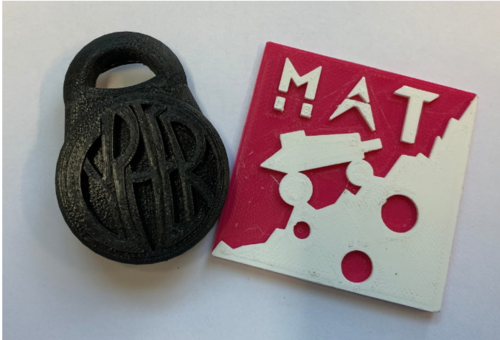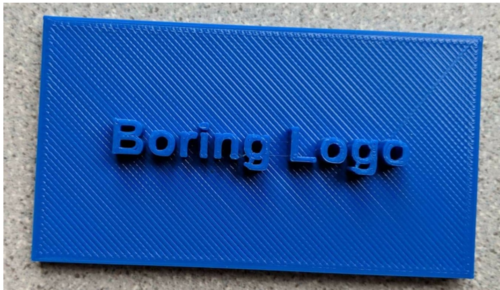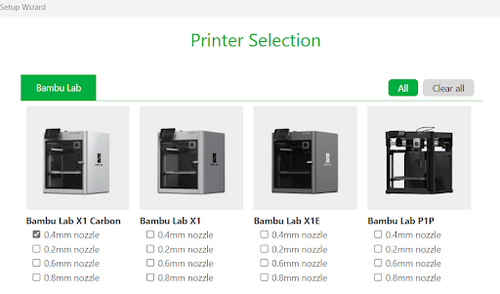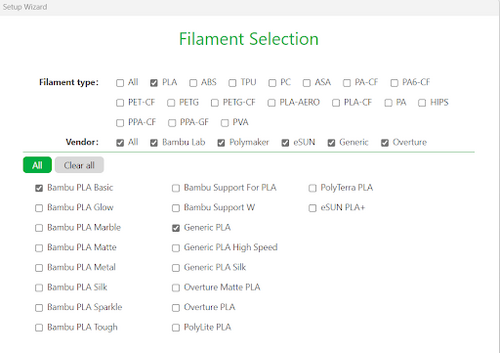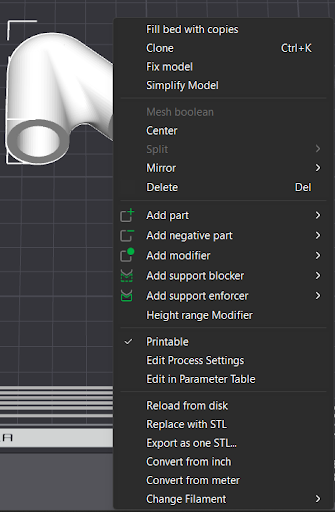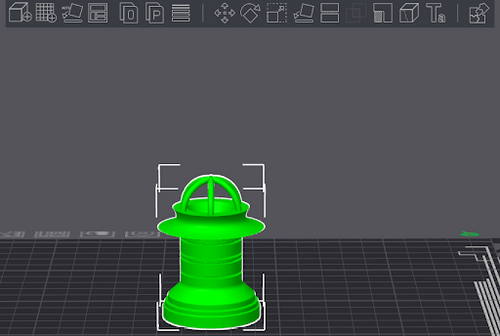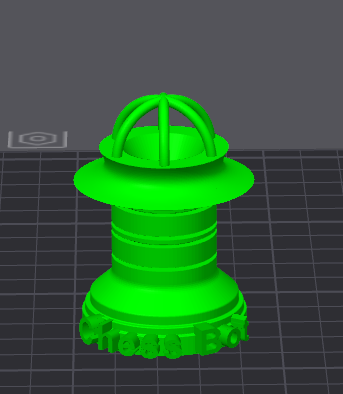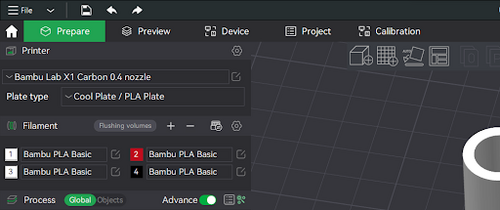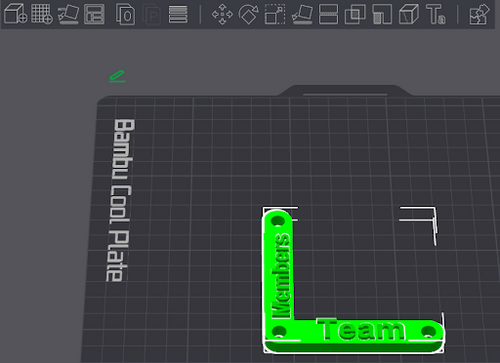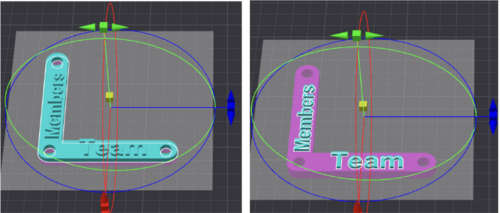Difference between revisions of "3D Printing and Logo Guide"
| Line 217: | Line 217: | ||
## Surface: Adjusts if the text is connected to a surface or free to move about | ## Surface: Adjusts if the text is connected to a surface or free to move about | ||
## Horizontal text: Moves the test to a perfectly straight line. | ## Horizontal text: Moves the test to a perfectly straight line. | ||
== Multicolor Part Method 1 == | |||
There are 2 ways to create a '''multicolor part.''' | |||
This method requires a bit more work in the CAD software before importing the part. You must import '''at least two STL files.''' This method is the easiest if you already have an assembly of objects in your CAD software previous to importing. '''If you only have 1 object try method 2.''' | |||
# To import the first file, click the “File” icon on the top left of your window. | |||
[[Image:Top_left.png|500px|thumb|center|Figure 9: Top left of Bambu Studio]] | |||
# Select both files, it will load them both onto the build plate. | |||
# Navigate to the “Stacking/Assembling Parts” or the “Selecting Colors” section for the next steps. | |||
== Multicolor Part Method 2 == | |||
This method requires a bit more work in the slicing software after placing the part on the build plate. Here you must have '''only 1 STL file'''. This method is easiest if you aren’t a big fan of CAD. | |||
# Navigate to the “Cut” tool in the Toolbar (Hamburger icon) | |||
[[Image:Logo_and_toolbar.png|500px|thumb|center|Figure 10: Image of Logo and Toolbar]] | |||
# Click and drag the gray box to the height of the separation. The blue and purple sections represent the 2 parts after the cut. | |||
[[Image:Left_right.png|500px|thumb|center| Figure 11: left) Before adjusting the cut. right) After adjusting the cut.]] | |||
# Hit “Preform cut” and your parts will be separate. To confirm navigate to the objects tab to view the 2 parts you have created. | |||
# Navigate to the“Selecting Colors” or “Stacking/Assembling Parts” section for the next steps. | |||
Revision as of 11:09, 19 February 2024
ProtoLab Schedule
All standard 3D Prints must be submitted, approved, and printed through ProtoLab unless given special permission by a ProtoLab TA, the Prototyping Committee, or a professor.
- Monday: 2 PM to 6 PM
- Tuesday through Friday: 12 PM to 6 PM
Mandatory 3D Printing for all SLDPs
Logos cannot be approved during Modelshop sessions.
All SLDP groups will be required to design and 3D print a one-color logo. All specifications outlined in the Logo specification section must be met. All SLDP groups may design and print a two-color logo to meet the mandatory 3D printing requirement and will receive extra credit for using two colors. Deadlines for this mandatory print are outlined in the deadlines section below and can be found under each individual SLDP page.
Groups must submit an STL file of a logo through the 3D Printing Submission portal by Benchmark A, receive approval from a ProtoLab TA by Benchmark B, and have it printed by Commissioning. The printed logo is a requirement for commissioning, and failure to do so will result in point penalties on the project grade. Prints made not within ProtoLab will not be accepted unless under special circumstances.
Mandatory Manufacturing for all RAD Projects
All RAD groups will be required to implement one manufacturing method in the creation of their prototype. Manufacturing methods include 3D Printing, Laser Cutting, CNC Milling, Advanced Printers, Sewing, and Wood Working. For all methods, training with the MakerSpace is required, go to their training website for the associated instructions to receive training for the desired method.
For 3D Printing, requests must be submitted through the ProtoLab and must follow the specifications outlined for VEX Parts in the “3D Printing & Extra Credit Specifications” further below. For Advanced Printers, requests must be submitted through the Advanced Prints Form on the EG Website.
3D Printing Extra Credit
For HIR projects, students can 3D print TWO stackable adjacent floor plans as a part of this extra credit. Printing the exterior of the building does not count towards this extra credit, but instead, is a project-specific extra credit. Submit an .STL file and .3mf Cura Project File of the two floors through the 3D Printing Submission portal and receive approval from a ProtoLab TA to get it printed before Commissioning. The exterior of the building must also be submitted as a zip folder with a .STL file and .3MF file through the 3D Printing Submission portal and receive approval from a ProtoLab TA to get it printed before Commissioning.
For VEX projects (MRR and LAZ), a robot part that will help their robot complete the course can also be designed. Robot parts can only be one color. Submit a zip folder with a .STL file and .3MF file of the VEX part through the 3D Printing Submission portal and receive approval from a ProtoLab TA to get it printed before Commissioning.
For RAD projects, there are no printing extra credit opportunities outside of project-specific extra credit. Mentor assigned extra credit tasks relating to printing are allowed only if it is for an additional manufacturing method different from the primary method and will only count for project-specific extra credit.
For all projects, all additional prints must adhere to the following specifications outlined in the next section. Prints that violate any of the specifications will be rejected and will not be printed nor count for extra credit for eligible prints.
Advanced Prints
For any group considering an advanced print through the MakerSpace:
- One person in the group must have completed the training on the machine prior to making the request.
- Groups must fill out the MakerSpace/EG1004 Print Request form and get approval from a ProtoLab TA before going to the MakerSpace to complete the print.
- For approval, you must present the file that you wish to print as well as making sure the specifications of the print line up with what was entered on the form.
- After filling out the form, you will have a week to complete the purchase otherwise it will be voided.
3D Printing & Extra Credit Specifications
All prints:
- Maximum Duration 12 hours; prints that exceed this limit will be assessed for feasibility with a different manufacturing method
- All submissions, including non-extra credit submissions, require a minimum of one .STL file and one .3MF file contained in a .ZIP folder. Submissions missing either file type will automatically be denied
- Original Design & Content
- Must be different from other groups’ submissions
- Must not include figures or models from other sources or .STLs generated using image converter softwares
- Must be complex; will be judged by ProtoLab TAs and the Prototyping Committee
Logos:
- Maximum material weight does not exceed 15 g total
- Can be one or two colors
- One-color logos are mandatory for all SLDP groups
- Two-color logos are extra credit for all SLDP groups
- Submission of two .STL files and one .3MF file containing both .STL files arranged and properly set for dual color (dual extruder) printing
- Logos must be integrated with your project in some way
- Must be original content
- Cannot be exclusively text or a simple geometric shape
- Correct file types must be submitted to 3D printing submission tab
- Must be exported as .STL from CAD program with correct scaling (make sure the document units are set to mm before exporting)
- Must be exported as .3MF from Ultimaker CURA with correct scaling (make sure the document units are set to mm before exporting)
HIR Models:
- Stackable Floorplan
- Maximum Size 8 x 8 x 8 in, Maximum Weight 300 grams, Maximum 1 Color
- Model should be equally scaled compared to the floorplan
- Floors should fully nest with each other; features spanning multiple levels should still be aligned
- Exterior Model (counts for project-specific extra credit)
- Maximum Size 8 x 8 x 8 in, Maximum Weight 300 grams, Maximum 1 Color
- Model should be equally scaled compared to the floorplan
- Features on each floor should be reduced/removed
- Model should contain the full detailed exterior of the building
RAD & VEX Parts:
- Maximum Size 11 x 11 x 11 in, Maximum Weight per part 300 grams, Maximum 1 Color
- Note: Maximum size includes the use of two build plates. Part must be able to be broken down to fit on printer
- All prints that are past 3 x 3 x 3 in will be evaluated for if a different manufacturing method can be used or if the design could be changed
- All parts that are past 5 x 5 x 5 in and are resubmitted due to a design change cannot be printed more than twice
- Printed parts must be able to assemble without the use of tape or glue
- Printed parts used for VEX course modifications are not permitted for use
Submission and General Guidelines
- Submission of your 3D designed parts will take place through the EG website using the “3D Printing Submission” tab of the left menu. DO NOT USE THE NORMAL SUBMISSION TAB. Submit your .STL files and .3MF files in a .ZIP file to the website.
- Make sure to submit an .STL with the correct scaling.
- If you choose to build your model in in, remember to convert to mm before saving the .STL
- Please name the .STL files in the format Section_Project_PrintType_FileNumber i.e. A1_HIR_Logo_1, and the .3MF in the format Section_Project_PrintType. Please make sure the colors selected match the file number of the .STL and selected extruder in the cura setup (i.e. A1_HIR_Logo_1 should match your Color 1 option and Extruder 1 in your Cura setup).
- After your submission has been received, you will need to meet with a Proto TA to have your print approved during Protolab hours.
- If you are a RAD group, you have the option to self-print your design (if it is NOT a Logo) at the MakerSpace. If you are a RAD group, please only submit non-logo prints to the website if you want Protolab to print your design. The same applies to LAZ and MRR group wanting to manufacture a robot part or course modification.
- You can check the status of your print from the “3D printing Submission” tab. “Pending” means your print is in the process of being approved. “Approved” means your print is in the queue to be printed (“Denied” means you will need to make changes and resubmit.) “Printed” means your print is finished. “Picked Up” means your print has been delivered.
- As you are submitting your 3D designs for your logos, course modifications, or robot parts, please keep in mind the requirements posted on the EG Manual. If you have any further questions, please email prototyping@eg.poly.edu.
- RAD: Prototyping TAs will have the final decision over whether or not a part should be 3D printed or manufactured using another method. Also, while some parts submitted for 3D printing may be taken from preexisting designs online, your end result should still be an original design in order to not violate NYU’s academic honesty guidelines.
Deadlines
- Initial STL file submission for mandatory prints is due by Benchmark A (Week 7)
- The 3D printing process can take multiple revisions, you are required to submit the first attempt by Benchmark A, but you will be allowed to make any modifications until the final deadline of Benchmark B.
- STL file approval for prints is due by Benchmark B (Week 10)
- You must meet with a Protolab TA during Protolab hours to get your print approved. You cannot get your print approved without meeting with a Protolab TA. Your print will not be processed if it is not approved.
- If you miss the Benchmark B deadline, subsequent submissions will not be considered. All submissions must be approved by this deadline (with very limited exceptions).
- Printed part by Commissioning Deadline (Week 14)
- You must have picked up your printed part by commissioning.
- Above deadlines are applicable to mandatory logo prints, extra credit prints fulfilling the mandatory logo print requirement, and all SLDPs extra credit prints.
- All non-mandatory prints must be submitted & approved at least one week prior to Commissioning deadline (Week 13)
- All prints approved before this deadline will be printed. If ProtoLab fails to deliver on an approved print request, please consult RAD mentor/recitation professor on adjusting project deliverables/expectations.
- All prints submitted/approved after this deadline are not guaranteed to be fulfilled. Project deliverables/expectations cannot be negotiated due to unfulfilled print requests after this deadline. Plan accordingly.
Design Considerations
- Make a flat bottom: A large flat bottom increases the adhesion between the build platform and the part, keeping the part from shifting around during a print.
- Keep overhangs close to 45 degrees: Each layer of a 3D print needs to be supported from below. You can avoid adding additional supports to a print if all the overhanging parts are at no more than a 45-degree angle from vertical.
- Avoid thin walls and thin columns: Thin walls and columns often do not come out well. The thickness of a thin wall should be a multiple of 0.35 mm. Thin columns will usually come out distorted because they melt under the nozzle.
Software
To design your logo you will need any CAD software as well as Cura. There are many options for software that can be used, the only necessary feature is that the software can export files as an .STL (stereolithography) extension.
Suggested:
- Autodesk Fusion 360 – Free student edition
Other examples of CAD software:
- Autodesk Inventor – Free student edition
- Blender – Free (Open source)
- OpenSCAD – Free (Open source)
- Solidworks – Available in NYU computer labs
Note: There may be limitations troubleshooting software other than Fusion 360 as TAs are mainly trained in Fusion.
To make a 2 color design you will need to save your logo in two separate .STL files (one for each color) and submit both as a .zip file to the website. The two files are then imported into CURA and aligned, with separate extruders selected for each color.
Bambu Studio Guide
Bambu Studio is a critical piece of software for our 3D Printers. STL/3MF files do not contain the instructions the printer needs to position the extruder; to do this, Bambu Studio “slices” the model into smaller layers. These layers are then converted to commands to move the machine called G-Code toolpath. The software is also used to set the proper color of filament used for each object. The Protolab TA can then load each extruder with the desired filament color and type.
Initial Setup
- Download Bambu Studio: Bambu Studio Download Link
- After downloading the software with the link above you will be prompted to select the region then asked to select the printers you’d like to have added to your library.
- Ensure that the Bambu Lab X1 Carbon with the 0.4 mm nozzle is the only box selected. If you do not select this printer your print will be denied by a Protolab TA. This is the only printer that is available in the Open Lab / Modelshop.
- After clicking “Next”, you will be presented with different filament types that can be used in the software. The Protolab only has PLA, so no other box should be checked. Ensure that your window matches Figure 2, above.
- After this you will be ready to start slicing your file. It will prompt you to create an account with Bambu Studio, however you do not need to create an account to use the software.
Toolbar
The toolbar near the top of Bambu Studio allows files to be adjusted on the plate before slicing. Please note that images might appear differently if Dark Mode is not enabled (See the appendix at the end of this document for how to enable Dark Mode).
Functions as listed from left to right in Fig. 3:
- Add: Object [Allows you to import another object on the plate]
- Add: Build Plate [Allows you to add another build plate if desired]*
- Auto: Orientation [Automatically places the object in a particular orientation]*
- Auto: Arrange [Automatically arranges object on the build plate]
- Split into objects [Splits model typically when using Text Tool]
- Split into parts [Splits model when using the Assemble Tool]
- Variable layer height [Creates different layer heights for faster printing]*
"*" These tools will most likely not be useful for your print, but are available options
Functions as listed from left to right in Fig. 4:
- Move: Translates the model in the X, Y, and Z directions
- Rotate: Rotates the model about a selected internal axis by dragging the rings around the object.
- Scale: Scales the model in the X, Y, and Z dimensions in mm or by a percentage.
- Uniform scaling: Preserves the objects original proportions
- To scale an individual dimension (ie thickness in the z direction), turn off uniform scaling
- Lay on Face: Adjusts the nearest flat edge of the object onto the platform.
- Cut [Cuts the object in to the amount of parts desired and the location selected]
- Mesh Boolean**
- Support Painting**
- Seam Painting**
- Text Shape**
- Color Painting**
- Assembly View [Allows you to view the model fully assembled]
"**" These tools will most likely not be useful for your print, but are available options
By selecting on the part and then right clicking, you are presented with the following useful options:
- Clone: make multiple copies of the part
- Fix Model: fixes the model in the current place
- Center: Moves the model to the center of the build plate
Part placement onto the build plate is a crucial step in preparing a Bambu Studio print file. One of the most common reasons for print failure is a poorly oriented part. The key is to minimize the overhanging elements of the model and ensure the part is printed on the most stable face.
Importing Files
To create single parts, simply:
- Navigate to the top left and click the file icon
- Select import,
- Pick the file you want to import from your computer.
Note the file must be of the following type: STL, STEP, 3MF, STP, SVG, AMF, or OBJ.
3D printing is a form of Fused Deposition Modeling (FDM)): individual layers of filament are deposited and fuse together. “Slicing” is the process of taking a 3D object and dividing it into these individual layers to generate a set of instructions for the printer’s extruder to follow, known as a “toolpath.” These toolpaths are stored as g-code files.
Adding Text
There are very simple ways to add text to your logo. The Bambu Studio software allows you to generate text on certain faces of your object.
- Navigate to the “Ta” Section of the Toolbar
- Fill out the desired text in the “Input Text” section
- Select the face where you would like the text to appear
- Adjust settings to achieve the desired look:
- Font: Adjusts the font type of the text
- Size: Adjusts the total size of the text
- Thickness: Adjusts the thickness of of the text
- Text Gap: Adjusts the space between the letters of the text
- Angle: Adjusts the angle at which the text aligns with
- Embedded depth: Adjusts how deep into the part the text is located
- Surface: Adjusts if the text is connected to a surface or free to move about
- Horizontal text: Moves the test to a perfectly straight line.
Multicolor Part Method 1
There are 2 ways to create a multicolor part. This method requires a bit more work in the CAD software before importing the part. You must import at least two STL files. This method is the easiest if you already have an assembly of objects in your CAD software previous to importing. If you only have 1 object try method 2.
- To import the first file, click the “File” icon on the top left of your window.
- Select both files, it will load them both onto the build plate.
- Navigate to the “Stacking/Assembling Parts” or the “Selecting Colors” section for the next steps.
Multicolor Part Method 2
This method requires a bit more work in the slicing software after placing the part on the build plate. Here you must have only 1 STL file. This method is easiest if you aren’t a big fan of CAD.
- Navigate to the “Cut” tool in the Toolbar (Hamburger icon)
- Click and drag the gray box to the height of the separation. The blue and purple sections represent the 2 parts after the cut.
- Hit “Preform cut” and your parts will be separate. To confirm navigate to the objects tab to view the 2 parts you have created.
- Navigate to the“Selecting Colors” or “Stacking/Assembling Parts” section for the next steps.
